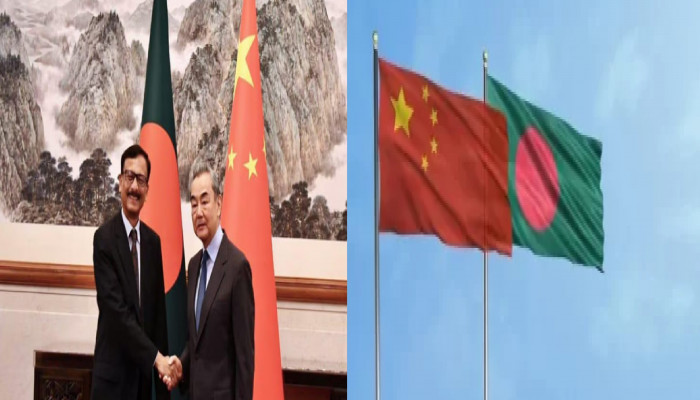China agrees to lower loan rates, extend repayment period for Bangladesh
- In Reports
- 04:37 PM, Jan 23, 2025
- Myind Staff
China has verbally agreed to reduce interest rates on loans and extend the repayment time to Bangladesh for its financial support under the Belt and Road Initiative (BRI), promising to review the demands in an effort to exert more diplomatic influence over the country.
During his visit to China this week, Bangladesh's Foreign Affairs Advisor Touhid Hossain spoke with Chinese Foreign Minister Wang Yi about a variety of topics, such as strategic alliances and economic cooperation. The trip highlights Bangladesh’s shift towards strengthening its economic and political ties with China and other East Asian countries, particularly as its relationship with India remains strained.
As China has chosen to back the current interim government in order to "further its own interests," Dr Mubashar Hasan, an expert on Bangladeshi politics and executive director of the Sydney Policy and Analysis Centre in Australia, told ThePrint that "more China-Bangladesh engagement" is likely in the "coming months."
“The Yunus government needs money and China has made a strategically smart move to choose to side with them, unlike India, which was a traditional ally during Hasina’s regime. While China was perhaps more financially supportive of Hasina than India during her rule, it chose to go about its business with the new government, whereas India chose to side with a fallen dictator, whose party is hugely unpopular right now,” he said.
Bangladesh's Ministry of Foreign Affairs has announced that the country has requested China to reduce the interest rates on Preferential Buyer’s Credit (PBC) and Government Concessional Loans (GCL) from the current 2-3 per cent to 1 per cent. Additionally, Bangladesh has asked China to waive the commitment fee and extend the loan repayment period from 20 years to 30 years.
China is the fourth-largest lender to Bangladesh after Japan, the World Bank, and the Asian Development Bank, according to Dr Ashikur Rahman, principal economist at the Policy Research Institute of Bangladesh, who spoke to ThePrint. Since 1975, China has disbursed $7.5 billion in loans. Five ongoing projects are allotted around $3.6 billion of this total. “As a result, any extension of a deadline or downward revision of interest rate will help improve debt service obligation. However, there has been no formal agreement yet—only a verbal assurance that the Chinese government will positively evaluate the request from Dhaka. On the whole, Chinese debt only accounts for less than 8 per cent of overall international debt, which makes our debt situation with China very manageable,” he added.
Hossain’s four-day official visit to China is the first since the new interim government took office in August. During their discussions, China reiterated its support for Bangladesh’s sovereignty and territorial integrity, especially regarding the ongoing mega-dam project on the Yarlung Tsangpo River. This river flows into India as the Brahmaputra and into Bangladesh as the Jamuna and Meghna rivers.
The two countries signed a Memorandum of Understanding (MoU) to share hydrological data on these vital water resources. Both sides highlighted Bangladesh’s strategic importance in the region and pledged to continue working together under the Belt and Road Initiative (BRI). They also discussed several Chinese-funded projects, including those related to infrastructure, energy and healthcare. Bangladesh’s foreign adviser requested more cooperation to improve access to quality healthcare for the people of Bangladesh. In reply, China agreed to set up three to four hospitals in Kunming for Bangladeshi patients and also supported the idea of establishing a Chinese hospital in Dhaka.
On the economic side, China responded positively to Bangladesh’s requests for help in areas such as railway development, education, agriculture, water resource management,\ and renewable energy. Both countries reviewed ongoing projects, including the Dasherkandi Sewage Treatment Plant, the upgrade of Mongla Port, and efforts to improve digital connectivity in Bangladesh. In the upcoming year, the two parties will commemorate the 50th anniversary of Bangladesh's diplomatic ties with China.







Comments